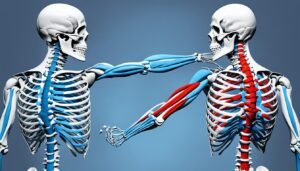Back pain can make life really hard and hold you back. You should see a back pain specialist for the best care. They are experts with lots of training in fixing different back pain conditions.
They know how to find and treat the cause of your back pain. They use tools to look inside your body without surgery. If surgery is needed, they can do it gently. They work hard to give you your life back by helping with your back pain.
Key Takeaways
- Back pain specialists have tons of knowledge in solving different types of back pain.
- They take a personal approach to get to the bottom of your back pain.
- You can get better with treatments that don’t need surgery or are very gentle.
- They know a lot about the spine and muscles in your body.
- If your back hurts, seeing a back pain specialist can make life better and pain-free.
Understanding Lower Back Pain
Lower back pain can happen in different ways. You need to know the difference between two main types: acute and chronic. Acute back pain comes on suddenly, often from an injury or event. It usually goes away in a few weeks with care. Chronic back pain lasts for three months or more and is harder to deal with.
Acute vs. Chronic Back Pain
Acute lower back pain shows up quickly, usually from something like a muscle strain or herniated disc. It often goes away within weeks if you take care of it. Chronic pain, though, sticks around for three months or longer. It might be from problems like arthritis or spinal stenosis.
Common Causes of Back Pain
Many things can cause lower back pain, like muscle strains or herniated discs. Factors include bad posture, lifting heavy things, and sudden moves. Knowing what’s behind your pain is the first step to finding the right treatment and management.
| Condition | Description |
|---|---|
| Muscle Strain | Overuse or sudden stretching of the muscles in the lower back, often caused by poor posture or heavy lifting. |
| Herniated Disc | A disc in the spine bulges or ruptures, putting pressure on the surrounding nerves and causing pain. |
| Arthritis | Inflammation and degeneration of the joints in the spine, leading to back pain and stiffness. |
| Osteoporosis | Weakening of the bones, including the vertebrae, making them more susceptible to fractures and pain. |
| Sciatica | Pain that radiates from the lower back down through the buttocks and legs, caused by compression of the sciatic nerve. |
| Spinal Stenosis | Narrowing of the spinal canal, which can put pressure on the spinal cord and nerves, leading to back pain and leg discomfort. |
Seeking Help from a Back Pain Specialist
If back pain is bothering you a lot, seeing a back pain expert is wise. They will look at everything closely and make a special plan just for you. Signs you need to visit include pain for more than a few weeks, very bad pain, trouble moving, and pain spreading to your legs. Also, if it stops you from doing things you like.
When to See a Specialist
Most grown-ups face back pain at some point, with even more at risk according to a spine surgeon. First, they try six weeks of working with physical therapists. If the pain stays, then an MRI might be needed to find why the pain has not gone away.
Types of Back Pain Specialists
Some doctors you might meet are orthopedists, neurosurgeons, physiatrists, and chiropractors. They each have special know-how and might join forces to help you best. Then there are pain doctors, who focus on understanding and helping with pain, and surgeons who look at your MRI to decide what’s next. Those at HSS in pain care have extra training and are certified.
Back pain might make you feel anxious or sad. Some folks find talking to psychiatrists helpful. Many wait too long before getting help for their back, thinking it will get better on its own. But, it’s smarter to seek help soon, to maybe avoid long-lasting pain wars.
Diagnostic Approach for Back Pain
A visit to a back pain specialist starts with a detailed
physical examination
. They check your posture, how much you can move, your muscle power, and nerve health. If needed, they might do more tests like X-rays, MRIs, or CT scans to see inside your body. These tests help find out what’s causing your
back pain
Physical Examination
The specialist looks at where your pain is, how bad it is, and how long it lasts. They will also check your reflexes, muscles, and feeling to see if there is a nerve problem. This all helps them figure out why you hurt and make a plan to help you feel better.
Imaging Tests and Procedures
If the regular exam doesn’t show everything, more tests like X-rays, MRI scans, or CT scans might be needed. These pictures can show problems with your bones, like herniated discs or narrow spaces in your spine. Sometimes, an electromyogram (EMG) is used to check how your nerves and muscles are working.
By doing all of these tests, the specialist can get a good view of what’s wrong. Then, they can make a treatment plan just for you to help fix the main problem and ease your pain.
Non-Surgical Treatments for Back Pain
Back pain doctors usually try non-surgical ways first. These treatments aim to lessen pain and speed up healing. Back pain treatment often involves physical therapy. This helps make you more flexible, makes your muscles stronger, and teaches you the right way to move.
Physical Therapy and Exercise
Working with a physical therapist can improve how well you move. You’ll also get stronger and learn how to prevent more back pain. Your therapist might show you special exercises and stretches to do at home. These can help you get better faster.
Medications and Injections
Doctors might also give you medications for back pain. This could be anti-inflammatory drugs, muscle relaxants, or pain relief for nerve pain. If needed, they may use injections right near the pain. This can be very helpful, especially with spinal shots like epidurals.
Behavioral Therapies and Pain Management
Dealing with the mental side of back pain is key too. Things like therapy or biofeedback can really help. And, taking a team approach to treatment can do wonders. With the right mix of therapies, many people can live with much less pain, with no surgery.
specialist for back pain
Are you looking for ways to ease back pain that just won’t go away? It’s key to connect with a skilled back pain specialist. These experts are really good at figuring out and helping with different sorts of back issues. They know a lot about everything from sudden back injuries to problems that get worse over time. Back pain specialists work together to give care that is just for you, using the latest tools. They offer treatments without surgery first. But, if you need surgery, they can do it with small cuts.
Finding out why your back hurts and finding the best treatment can help you move easier and feel better. This means a lot for your life. No matter if you hurt your back recently or have had pain for a while, seeing a specialist can really help with getting better and staying well.
Surgical Options for Back Pain Relief
For some people with really bad back pain, back pain surgery could be needed. This is usually after trying other ways that don’t work. Doctors like orthopedic surgeons and neurosurgeons have ways to help.
Minimally Invasive Spine Surgery
Minimally invasive spine surgery uses small cuts. It also uses special tools. It’s good for problems like herniated discs or a narrow spine, with a fast healing time.
This surgery can also lower risks of trouble after the operation. It helps people get better quickly.
Spinal Decompression and Fusion
Spinal decompression helps take off pressure from the spine’s nerves. Spinal fusion joins bones in the spine together. These surgeries fix problems like bad discs or an unstable spine.
Disc Replacement and Vertebroplasty
For some, getting a new disc or a cement injection might help. Disc replacement or vertebroplasty can make things work better and stop pain.
The doctor will look at your situation and pick the right surgery if you need it. The goal is to help you feel better for the long run.
Comprehensive Back Pain Treatment Centers
Dealing with comprehensive back pain treatment can be tough. But a special center can help a lot. They use many doctors like orthopedists, neurosurgeons, and more. This team works together to make a plan just for you.
The center Offers many services. They do tests, give medicine, and can even do surgeries. The main goal is to find why your back hurts and help you feel better. They make sure you get the best care to improve your life.
Preventing and Managing Chronic Back Pain
Back pain can be treated, but it’s good to stop it before it starts. You can keep your spine healthy and lower the chance of pain coming back. A smart, full approach to back care can keep you from getting hurt and help if you have ongoing pain.
Lifestyle Modifications
Keeping a good weight, doing exercises, and watching how you stand or lift can cut back stress on your back. Try activities like walking, swimming, or biking to build up your core and back. This makes you more flexible and gives your spine support. Also, pay attention to how you sit, stand, and lift heavy things. It can stop back problems down the road.
Workplace Ergonomics
Your work setup is key to avoiding back pain. Make sure your desk is right for your back, take breaks to move around, and use chairs and tools that are good for your body. Easy changes, like a comfy chair or a higher computer screen, plus breaks for standing, can keep your back healthy.
| Preventing Back Pain | Managing Chronic Back Pain |
|---|---|
|
|
Use these tips and strategies daily to keep your back healthy and fight against lasting pain. It’s all about taking action every day to feel better and live a fuller life.
Conclusion
Back pain can make life tough, stopping you from doing what you love. But, a good back pain specialist can help. They will check what’s wrong and come up with a plan just for you.
They offer many ways to feel better, like therapy or even surgery. By teaming up with these experts, you can start feeling better. It doesn’t matter if it’s a new pain or something that’s been around. Don’t wait to get help and start healing.
Working with a specialist means you can get moving again. They will make a plan that’s just for you. This can help lower the pain and make life better. So, don’t wait if you’re hurting. A specialist can really change things and help you for the long run.




